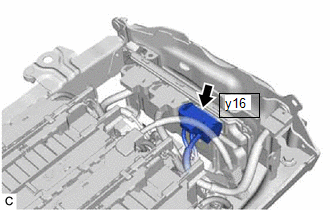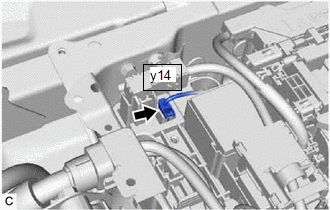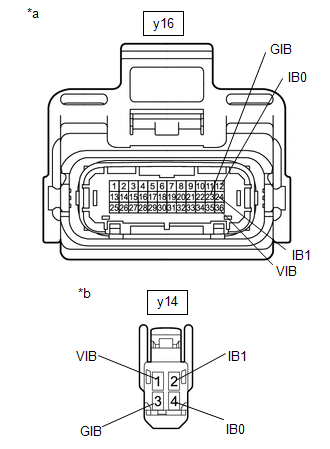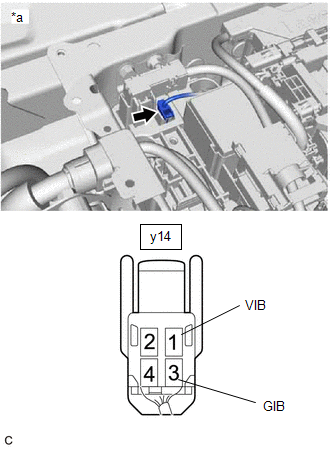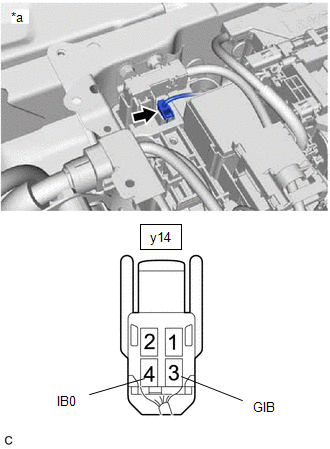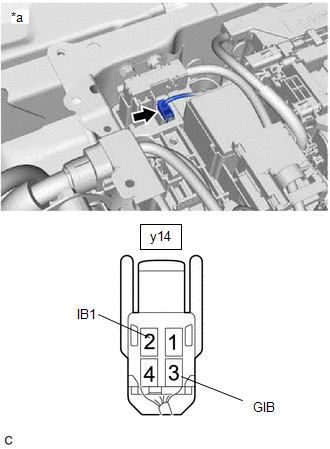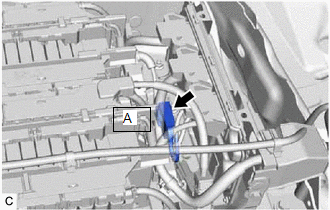Lexus ES: Hybrid/EV Battery Current Sensor "A" Signal Bias Level Out of Range / Zero Adjustment Failure (P0ABF28)
DESCRIPTION
Refer to the description for DTC P0ABF11.
Click here .gif)
| DTC No. | Detection Item | DTC Detection Condition | Trouble Area | MIL | Warning Indicate |
|---|---|---|---|---|---|
| P0ABF28 | Hybrid/EV Battery Current Sensor "A" Signal Bias Level Out of Range / Zero Adjustment Failure | The offset value of the battery current sensor is excessively large. (1 trip detection logic) |
| Comes on | Master Warning Light: Comes on |
| DTC No. | Data List |
|---|---|
| P0ABF28 | Hybrid/EV Battery Current |
HINT:
- Make sure to perform Current Sensor Offset Learning after replacing a battery current sensor.
- This DTC may be output if Current Sensor Offset Learning has not been completed.
MONITOR DESCRIPTION
If the battery ECU assembly detects a malfunction in a battery current sensor, the battery ECU assembly will illuminate the MIL and store a DTC.
MONITOR STRATEGY
| Related DTCs | P0AC0 (INF P0ABF28): Current sensor malfunction |
| Required sensors/components | Battery current sensor |
| Frequency of operation | Continuous |
| Duration | TMC's intellectual property |
| MIL operation | 1 driving cycle |
| Sequence of operation | None |
TYPICAL ENABLING CONDITIONS
| The monitor will run whenever the following DTCs are not stored | TMC's intellectual property |
| Other conditions belong to TMC's intellectual property | - |
TYPICAL MALFUNCTION THRESHOLDS
| TMC's intellectual property | - |
COMPONENT OPERATING RANGE
| Battery ECU assembly | DTC P0AC0 (INF P0ABF28) is not detected |
CONFIRMATION DRIVING PATTERN
HINT:
-
After repair has been completed, clear the DTC and then check that the vehicle has returned to normal by performing the following All Readiness check procedure.
Click here
.gif)
-
When clearing the permanent DTCs, refer to the "CLEAR PERMANENT DTC" procedure.
Click here
.gif)
- Connect the Techstream to the DLC3.
- Turn the power switch on (IG) and turn the Techstream on.
- Clear the DTCs (even if no DTCs are stored, perform the clear DTC procedure).
- Turn the power switch off and wait for 2 minutes or more.
- Turn the power switch on (IG) and turn the Techstream on.
- Drive the vehicle on urban roads for approximately 10 minutes.[*1]
- Turn the power switch off and wait for 2 minutes or more.[*2]
- Turn the power switch on (IG) and turn the Techstream on.[*3]
-
With power switch on (IG) and wait for 10 seconds or more.[*4]
HINT:
[*1] to [*4]: Normal judgment procedure.
The normal judgment procedure is used to complete DTC judgment and also used when clearing permanent DTCs.
- Enter the following menus: Powertrain / HV Battery / Utility / All Readiness.
-
Check the DTC judgment result.
HINT:
- If the judgment result shows NORMAL, the system is normal.
- If the judgment result shows ABNORMAL, the system has a malfunction.
- If the judgment result shows INCOMPLETE or N/A, perform the normal judgment procedure again.
WIRING DIAGRAM
Refer to the wiring diagram for DTC P0ABF11.
Click here .gif)
CAUTION / NOTICE / HINT
CAUTION:
-
Before the following operations are conducted, take precautions to prevent electric shock by turning the power switch off, wearing insulated gloves, and removing the service plug grip from HV battery.
.png)
- Inspecting the high-voltage system
- Disconnecting the low voltage connector of the inverter with converter assembly
- Disconnecting the low voltage connector of the HV battery
-
To prevent electric shock, make sure to remove the service plug grip to cut off the high voltage circuit before servicing the vehicle.
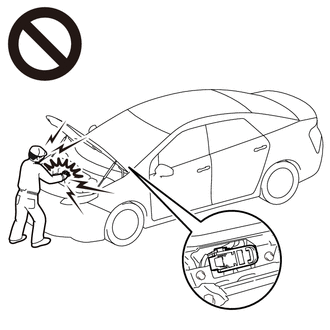
-
After removing the service plug grip from the HV battery, put it in your pocket to prevent other technicians from accidentally reconnecting it while you are working on the high-voltage system.
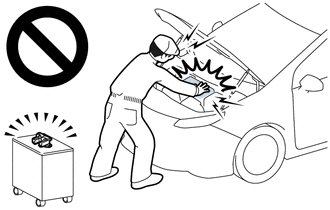
-
After removing the service plug grip, wait for at least 10 minutes before touching any of the high-voltage connectors or terminals. After waiting for 10 minutes, check the voltage at the terminals in the inspection point in the inverter with converter assembly. The voltage should be 0 V before beginning work.
Click here
.gif)
.gif)
HINT:
Waiting for at least 10 minutes is required to discharge the high-voltage capacitor inside the inverter with converter assembly.
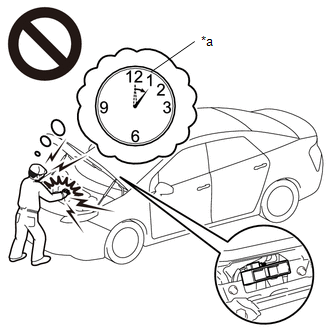
*a
Without waiting for 10 minutes
-
Make sure to insulate the high-voltage connectors and terminals of the HV battery with insulating tape after removing it.
If the HV battery stored without insulating the connectors and terminals, electric shock or fire may result.
-
When disposing of an HV battery, make sure to return it through an authorized collection agent who is capable of handling it safely. If the HV battery is returned via the manufacturer specified route, it will be returned properly and in a safe manner by an authorized collection agent.
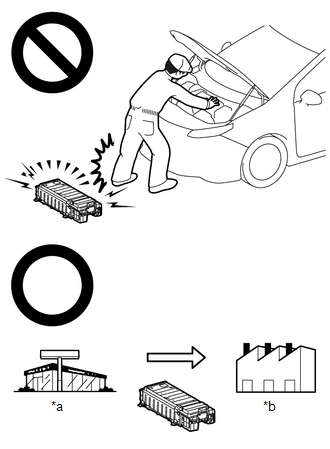
*a
Dealer
*b
Battery Collection Agent
- Accidents such as electric shock may result if the HV battery is disposed of improperly or abandoned. Therefore, make sure to return all HV batteries through an authorized collection agent.
-
Before returning the HV battery, make sure to perform a recovery inspection.
Click here
.gif)
-
Before returning the HV supply stack sub-assembly, make sure to perform a recovery inspection.
Click here
.gif)
- Make a note of the output DTCs as some of them may be necessary for recovery inspection of the HV battery and HV supply stack sub-assemblies.
-
After removing the HV battery, keep it away from water. Exposure to water may cause the HV battery to produce heat, resulting in a fire.
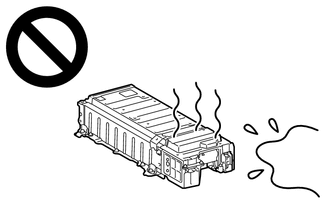
NOTICE:
After turning the power switch off, waiting time may be required before disconnecting the cable from the negative (-) auxiliary battery terminal. Therefore, make sure to read the disconnecting the cable from the negative (-) auxiliary battery terminal notices before proceeding with work.
Click here .gif)
.gif)
PROCEDURE
| 1. | CHECK DTC OUTPUT (HV BATTERY, HYBRID CONTROL) |
(a) Connect the Techstream to the DLC3.
(b) Turn the power switch on (IG).
(c) Enter the following menus: Powertrain / HV Battery and Hybrid Control / Trouble Codes.
(d) Check for DTCs.
Powertrain > HV Battery > Trouble Codes Powertrain > Hybrid Control > Trouble Codes| Result | Proceed to |
|---|---|
| "P0ABF28" only is output, or DTCs except the ones in the table below are also output. | A |
| DTCs of hybrid battery system in the table below are output. | B |
| DTCs of hybrid control system in the table below are output. | C |
| System | Relevant DTC | |
|---|---|---|
| Hybrid battery system | P060A47 | Hybrid/EV Battery Energy Control Module Monitoring Processor Watchdog / Safety MCU Failure |
| P060B49 | Hybrid/EV Battery Energy Control Module A/D Processing Internal Electronic Failure | |
| P060687 | Hybrid/EV Battery Energy Control Module Processor to Monitoring Processor Missing Message | |
| P062F46 | Hybrid/EV Battery Energy Control Module EEPROM Calibration / Parameter Memory Failure | |
| Hybrid control system | P0A1F94 | Hybrid/EV Battery Energy Control Module Unexpected Operation |
(e) Turn the power switch off.
| B | .gif) | GO TO DTC CHART (HYBRID BATTERY SYSTEM) |
| C | .gif) | GO TO DTC CHART (HYBRID CONTROL SYSTEM) |
|
| 2. | CHECK HARNESS AND CONNECTOR (BATTERY ECU ASSEMBLY - NO. 1 HV SUPPLY STACK SUB-ASSEMBLY) |
Click here .gif)
| NG | .gif) | GO TO STEP 11 |
|
| 3. | CHECK HARNESS AND CONNECTOR (NO. 2 HV SUPPLY STACK SUB-ASSEMBLY - HV BATTERY JUNCTION BLOCK ASSEMBLY) |
Click here .gif)
| NG | .gif) | REPLACE NO. 2 HV SUPPLY STACK SUB-ASSEMBLY |
|
| 4. | CHECK HARNESS AND CONNECTOR (BATTERY ECU ASSEMBLY - HV BATTERY JUNCTION BLOCK ASSEMBLY) |
CAUTION:
Be sure to wear insulated gloves and protective goggles.
(a) Check that the service plug grip is not installed.
NOTICE:
After removing the service plug grip, do not turn the power switch on (READY), unless instructed by the repair manual because this may cause a malfunction.
(b) Remove the No. 1 HV battery hose.
Click here .gif)
.gif)
| (c) Disconnect the y16 battery ECU assembly connector. NOTICE: Before disconnecting the connector, check that it is not loose or disconnected. |
|
| (d) Disconnect the y14 battery current sensor connector from the HV battery junction block assembly. NOTICE: Before disconnecting the connector, check that it is not loose or disconnected. |
|
| (e) Measure the resistance according to the value(s) in the tables below. Standard Resistance (Check for Open):
Standard Resistance (Check for Short):
|
|
(f) Reconnect the y14 battery current sensor connector to the HV battery junction block assembly.
(g) Reconnect the y16 battery ECU assembly connector.
(h) Install the No. 1 HV battery hose.
| NG | .gif) | GO TO STEP 10 |
|
| 5. | CHECK HV BATTERY JUNCTION BLOCK ASSEMBLY (BATTERY CURRENT SENSOR (IB0)) |
CAUTION:
Be sure to wear insulated gloves and protective goggles.
(a) Check that the service plug grip is not installed.
NOTICE:
After removing the service plug grip, do not turn the power switch on (READY), unless instructed by the repair manual because this may cause a malfunction.
(b) Remove the No. 1 HV battery cover panel RH.
Click here .gif)
.gif)
(c) Connect the cable to the negative (-) auxiliary battery terminal.
(d) Turn the power switch on (IG).
| (e) Using a toyota electrical tester set to 40 V, measure the VIB voltage according to the value(s) in the table below.
NOTICE:
|
|
| (f) Using a toyota electrical tester set to 4 V, measure the IB0 voltage according to the value(s) in the table below.
NOTICE: Be sure to set the toyota electrical tester to 4 V when performing this test. |
|
(g) Compare the measured values of the IB0 terminal voltage and VIB terminal voltage using the following formula:
| IB0 voltage - 0.56 X VIB Voltage = less than 0.084 V |
| IB0 voltage - 0.56 X VIB Voltage = -0.084 V or higher |
| Result | Proceed to |
|---|---|
| Within the specified range above | A |
| Other than above | B |
(h) Turn the power switch off.
(i) Disconnect the cable from the negative (-) auxiliary battery terminal.
(j) Install the No. 1 HV battery cover panel RH.
| B | .gif) | REPLACE HV BATTERY JUNCTION BLOCK ASSEMBLY |
|
| 6. | CHECK HV BATTERY JUNCTION BLOCK ASSEMBLY (BATTERY CURRENT SENSOR (IB1)) |
CAUTION:
Be sure to wear insulated gloves.
(a) Check that the service plug grip is not installed.
NOTICE:
After removing the service plug grip, do not turn the power switch on (READY), unless instructed by the repair manual because this may cause a malfunction.
(b) Remove the No. 1 HV battery cover panel RH.
Click here .gif)
.gif)
(c) Connect the cable to the negative (-) auxiliary battery terminal.
(d) Turn the power switch on (IG).
| (e) Using a toyota electrical tester set to 40 V, measure the VIB voltage according to the value(s) in the table below.
NOTICE:
|
|
| (f) Using a toyota electrical tester set to 4 V, measure the IB1 voltage according to the value(s) in the table below.
NOTICE: Be sure to set the toyota electrical tester to 4 V when performing this test. |
|
(g) Compare the measured values of the IB1 terminal voltage and VIB terminal voltage using the following formula:
| Condition |
|---|
| IB1 voltage - 0.44 X VIB Voltage = less than 0.078 V |
| IB1 voltage - 0.44 X VIB Voltage = -0.078 V or higher |
| Result | Proceed to |
|---|---|
| Within the specified range above. | A |
| Other than above | B |
(h) Turn the power switch off.
(i) Disconnect the cable from the negative (-) auxiliary battery terminal.
(j) Install the No. 1 HV battery cover panel RH.
| B | .gif) | REPLACE HV BATTERY JUNCTION BLOCK ASSEMBLY |
|
| 7. | REPLACE BATTERY ECU ASSEMBLY |
Click here .gif)
.gif)
|
| 8. | SIMULATION TEST |
(a) Connect the Techstream to the DLC3.
(b) Turn the power switch on (IG).
(c) Enter the following menus: Powertrain / HV Battery / Trouble Codes.
(d) Clear the DTCs and freeze frame data.
Powertrain > HV Battery > Clear DTCs(e) Drive the vehicle on urban roads for approximately 10 minutes.
(f) Turn the power switch off and wait for 2 minutes or more.
(g) Turn the power switch on (IG) and wait for 10 seconds or more.
|
| 9. | CHECK DTC OUTPUT (HV BATTERY) |
(a) Connect the Techstream to the DLC3.
(b) Turn the power switch on (IG).
(c) Enter the following menus: Powertrain / HV Battery / Trouble Codes.
(d) Check for DTCs.
Powertrain > HV Battery > Trouble Codes| Result | Proceed to |
|---|---|
| DTCs are not output. | A |
| P0ABF28 is also output. | B |
(e) Turn the power switch off.
| A | .gif) | END |
| B | .gif) | REPLACE HV BATTERY JUNCTION BLOCK ASSEMBLY |
| 10. | CHECK HARNESS AND CONNECTOR (NO. 1 HV SUPPLY STACK SUB-ASSEMBLY - HV BATTERY JUNCTION BLOCK ASSEMBLY) |
CAUTION:
Be sure to wear insulated gloves and protective goggles.
(a) Check that the service plug grip is not installed.
NOTICE:
After removing the service plug grip, do not turn the power switch on (READY), unless instructed by the repair manual because this may cause a malfunction.
(b) Remove the No. 1 HV battery hose.
Click here .gif)
.gif)
| (c) Disconnect the A No. 1 HV supply stack sub-assembly connector. NOTICE: Before disconnecting the connector, check that it is not loose or disconnected. |
|
(d) Check the terminals of the male side of the A No. 1 HV supply stack sub-assembly connector.
OK:
The terminals are free of foreign matter and not damaged.
(e) Reconnect the A No. 1 HV supply stack sub-assembly connector.
(f) Install the No. 1 HV battery hose.
| OK | .gif) | REPLACE NO. 2 HV SUPPLY STACK SUB-ASSEMBLY |
| NG | .gif) | REPLACE NO. 1 HV SUPPLY STACK SUB-ASSEMBLY |
| 11. | CHECK HARNESS AND CONNECTOR (NO. 2 HV SUPPLY STACK SUB-ASSEMBLY - HV BATTERY JUNCTION BLOCK ASSEMBLY) |
Click here .gif)
| OK | .gif) | REPLACE NO. 1 HV SUPPLY STACK SUB-ASSEMBLY |
| NG | .gif) | REPLACE NO. 1 HV SUPPLY STACK SUB-ASSEMBLY AND NO. 2 HV SUPPLY STACK SUB-ASSEMBLY |

.gif)
